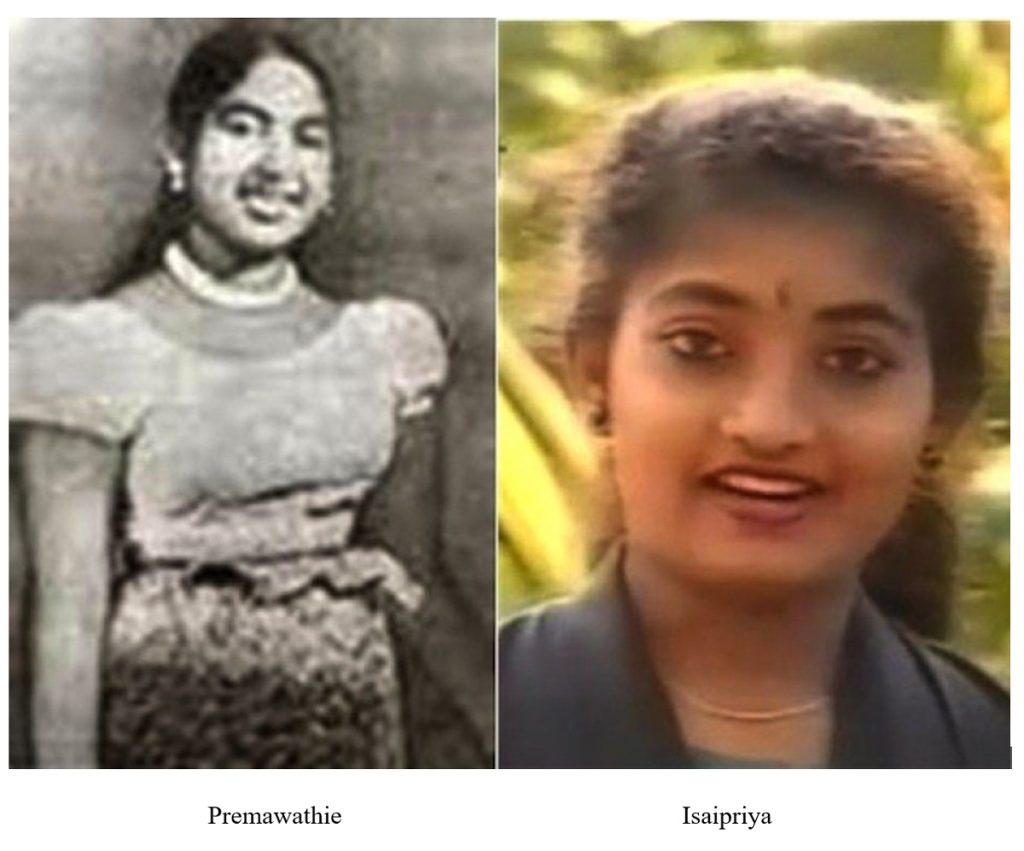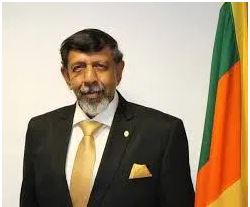This article first appeared in Colombo Telegraph on: March 26, 2019
Six degrees of separation is the theory that every person on this planet can be connected to any other person on the planet through a chain of people, places, events that has no more than five layers or intermediaries. Mathematicians and MIT professors have researched this theory and see some validity.

Premawathie Manamperi was a beautiful 22-year-old Sinhala woman from Kataragama. If you don’t believe me about her beauty, let me tell you, she was crowned Avurudhu Kumari in April 1970. She was a pleasant happy girl coming from a modest home living with her parents and ten siblings. If you search the archives, you may come across pictures of her in black and white. Even the greyscale cannot hide her beauty. She was living at a time where there were no cell phones or the internet.
Shobana Dharmarajah, popularly known as Isaipriya, was a beautiful 27-year-old Tamil girl from Jaffna. Just search for her name, and you will see why I call her a beauty. Unlike Premawathie, Isaipriya was fully immersed and grew up in the cell phone/internet era. Isaipriya was a media personality, a journalist, and a broadcaster. The LTTE hired her to broadcast news from their network.
I feel connected to Premawathie – because I walked the same streets, she walked on. I went to Katharagama first as a child with my parents and walked from Tissamaharama to Katharagama on many occasions. I snacked on buns and tea at the same tea boutiques where Premawathie snacked on buns and tea. Premawathie and I worshipped at the same Katharagama Devaley, the jungle shrine, with mystique rituals and practices.
[proof 1, six degrees of separation]
I feel connected to Isaipriya – because she walked the same streets in Jaffna town that I walked on when I lived in Jaffna in the ’60s. She enjoyed ice cream at Subhas Café at the Jaffna central bus station, where I would swing by for my fix of ice cream made with full cream milk, loaded with calories when I was a student in Jaffna. And to round off my connection to Isaipriya, she attended Vembadi Girls High School in Jaffna, a school my mother and my sister attended.
[proof 2, of six degrees of separation]
Now here comes the bombshell – further proof of six degrees of separation.
I feel Premawathie and Isaipriya were connected. They both met their death in the hands of The Sri Lankan Army! Sri Lankan Army is the common link that connected Premawathie from the South and Isaipriya from the North.
They were both alive when the army picked them up, but soon after, they were both dead. Though their timeline was thirty-eight years apart, there is an eerie unity in their death! Unbeknownst to each other, they became sisters in their end, and the Sri Lankan Army facilitated their sisterhood.
[proof 3, of six degrees of separation]
On April 5, 1971, Jathika Vimukthi Peramuna (JVP) launched a surprise attack on several police stations and government installations in the south to overthrow the democratically elected government of Sirimavo Bandaranaike. Around mid-April 1971, the army was deployed in southern Sri Lanka to bring the JVP insurgency under control. There was no evidence that Premawathie was connected to the JVP.insurgency. The military picked up Premawathie – after several hours of interrogation, stripped her naked and forced her to walk the streets of Katharagama.
Then, two army officers, Lieutenant Wijesuriya of Gemunu Watch and private Ratnayake sprayed bullets into her with a Sterling sub-machine gun. As she was crawling on the ground, still alive, she was picked up and buried alive in a pit in a vacant lot. Minutes later, another soldier from Wijesuriya’s unit came and put a bullet through her head and finished the job. [this gruesome narrative is straight from the court proceedings and evidence presented in court – by witnesses including civilians and soldiers]
There is no doubt that Isaipriya was an LTTE sympathizer and was doing broadcasts for the LTTE. During the final stages of the war, still and video images show the soldiers taking Isaipriya into custody in the Nandi Kadal area. Subsequent forensic examination revealed Isaipriya shot in the head execution-style, and her body desecrated.
Premawathie and Isaipriya were both alive when the army picked them up.
Minutes later, both were dead!
Most of us forgot Premawathie, who died in the hands of the army almost fifty years ago. The military killed Isaipriya ten years ago. If alive today, Premawathie would be a great grandmother, still a beautiful seventy-something! Isaipriya would be thirty-seven, probably in prison or rehabilitation camp for her involvement with the LTTE.
But Premawathie and Isaipriya, who were connected just by one layer, were both dead – in the hands of the Sri Lanka Army.
In case you are wondering where I am going with this story, let me assure you it is not an attempt to solicit your pity or sympathy for Premawathie or Isaipriya. My objective is to examine the validity of the theory, “Six Degrees of Separation”.
Here is bombshell number 2.
Wijesuriya and I are connected!!
Prosecutors charged Wijesuriya and Ratnayake with two counts of attempted murder because Premawathie was still alive when they buried her after Wijesuriya and Ratnayake gunned her down. Witnesses couldn’t identify the third soldier who shot her through the head to finish her off.
Wijesuriya came from a wealthy Colombo family and owned a tire re-treading and rebuilding business next to my office in Slave Island. While awaiting trial and out of the military, he would visit his shop a couple of days a week, and I occasionally run into him because we both used the same parking lot for our vehicles.
[proof 4, of six degrees of separation]
The evidence was rock solid, and Wijesuriya and Ratnayake were convicted by the supreme court and sentenced to sixteen years of rigorous imprisonment. Wijesuriya promptly appealed to the Court of Criminal Appeal.
Some of the most brilliant Sri Lankan legal scholars sat on the Court of Criminal Appeal. Wijesuriya v. The State was heard by some well-known justices at that time: Justice A.C Alles, Justice Vincent Thamotheram, and Justice Christie Weeramantry.
Believe it or not, I was connected to these justices!
My father, a civil servant under the ministry of justice, worked as a Court Administrator and served in all the provincial courts throughout Sri Lanka during his thirty-year tenure with the government. He was well versed in court administration and loved the Administration of Justice in Sri Lanka as it existed then. During his thirty-year career with the ministry of justice, my father either directly or indirectly worked under all three Justices of the Court of Criminal Appeal that heard Wijesuriya’s case. He took pride in sharing with us, his family, how brilliant the Judges were in the judicial system throughout Sri Lanka during his tenure.
[proof 5, of six degrees of separation]
The three justices heard Wijesuriya and Ratnayake’s appeal, and each of them discussed, deliberated, and presented some of the best analysis of the case with clarity and brilliant jurisprudence.
In the end, they delivered a unanimous verdict – upholding the Supreme Court’s decision with no reduction in sentence for Wijesuriya and Ratnayake. The Justices upheld the sixteen-year rigorous imprisonment.
[The Appeal verdict is located at: https://www.lawnet.gov.lk/1977/12/31/a-wijesuriya-and-another-appellants-and-the-state-respondent/]
After retirement, Justice A.C Alles became a prolific writer, both fiction and non-fiction. His writings on legal matters are brilliant. On maintaining Judicial Independence, he wrote:
Judges are responsible to themselves and their conscience to make their decisions in a Court of Law – without fear or favor to maintain the administration of justice in accordance with the Rule of Law.
Justice Weeramantry, a brilliant legal scholar, served as Professor of Law at Monash University, Australia, and was a member of the International Court of Justice (ICJ). He was elected Vice President of ICJ and when he wrote a dissenting opinion maintaining that nuclear weapons should be banned even at times of war, a view that was contrary to the view of majority judges on the ICJ from Western nations.
Besides these two giants of Sri Lankan Judicial structure of the past, there were other brilliant legal minds that served with distinction: Justice Sansoni, Justice H.N.G Fernando, Justice T.S. Fernando, Justice Victor Tennekoon to name a few.
Premawathie was wronged. She was brutally murdered by the Sri Lanka Army. Her parents will never get her back. But the justice system did not let Premawathie or her parents down. The system held the perpetrators accountable. The police, the investigators, the witnesses, the prosecutors, and the judges all did their job. The family did not have to go to the UNHRC or the International Court of Justice. The Manamperi family, a humble, modest, peasant folk from Katharagama, delivered justice for the injustice done by the Sri Lanka Army to their oldest daughter Premawathie, a Beauty Queen and pride of their family. The Justice system in Sri Lanka in 1971 – 1973 functioned just the way it was meant to and delivered justice to Premawathie and her family.
The Justice system in Sri Lanka today is separated from the Justice System of the 1970’s – not by six degrees, but by six thousand degrees!
That is why justice for Isaipriya has to be delivered by someone outside of the Sri Lankan judicial system.









